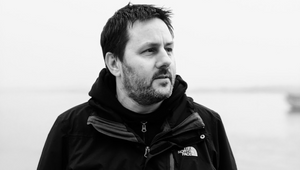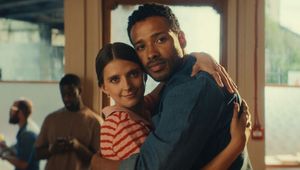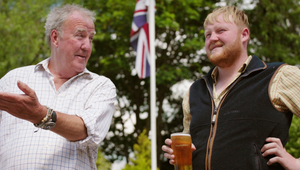
“Sound Bypasses Your Brain and Goes Straight to the Heart”

As the world is forced into self-isolation, many of us will have become accustomed to the instantly recognisable ‘ba-dum’ of Netflix launching on our screens. And with McDonald’s temporarily closing its doors, we perhaps won’t be hearing much ‘ba-da-ba-ba-bah’ anymore.
Despite how much or how little we’ll be hearing from these two brands right now, one thing is for certain - their audio identities will remain firmly ingrained in our minds.
Sonic branding is a powerful tool. In just a few notes or a few words from a particular voice, we can instantly recognise a brand - something that Rich Martin, sound designer at ENVY Advertising, is all too familiar with. Having worked on channel identity music for renowned brands such as BBC 3, Film 4, E4, Channel 4, Dave, Discovery, Syfy, and many more international channels, Rich has years of experience in designing sound that can represent an entire brand.
In an interview with LBB’s Sunna Coleman, Rich discusses the depths of what sound can offer and shares his career highlights including opportunities to record at Abbey Road, Angel and Olympic Studios.
Q> Tell us about your journey into sound. Were you quite musical as a kid?
Rich Martin> I was kind of musical in an untutored way. The earliest birthday present I remember was my mum making a microphone out of wood for me. I think I was about four, and even then I was into Top of the Pops and stuff like that. I really loved that microphone!
I played the guitar as a child and picked up a few other instruments along the way but it wasn’t until later life that I learned a bit of piano, and more recently drum lessons - so I’m still accumulating instruments as I go! I enjoy getting my head around a new instrument, and I’m currently using the isolation to start playing with a new electronic drum kit at home along with a bass guitar I picked up not so long ago.
Q> Do the instruments that you are learning influence your work in any way?
Rich> All of this feeds into the way I write music at work, I tend to write on a computer before working with professionals for the final mix. No one needs to hear me bang on the drums when we’re surrounded by brilliantly skilled musicians, but all of that stuff is really good for the writing process because it means I’ve got an understanding of what the capabilities of the instrument are and how it fits into the mix.
Freeview - The Other Way
Q> You have written identity music for some of the biggest international channels. What factors do you need to take into consideration when creating the defining sound of a brand?
Rich> Probably the most important thing is to get a clear sense of what the client perceives their brand to be and what they want to say about themselves. That information is hardly ever in the brief itself, you need to talk to the client to get it out of them. Lots of brands say the same thing: ‘the brand is big and vibrant, friendly and warm!’ That could mean anything. That could mean Ed Sheeran or Foals, they’d both fit that criteria. Branding work is good because it’s more of a journey you go on with a client. That’s what I really enjoy.
Q> How long has audio branding been around? Is it picking up popularity again through platforms such as podcasts?
Rich> Branding has been around as long as radio. Early radio stations used to broadcast the same piece of music at the same time of day to help listeners find them on the dial. It’s grown from there. I think the great thing about podcasts is that speech radio used to be limited to Radio 4 and phone-ins until podcasts came along. I’ve always been into radio, it’s the direction I initially wanted to head with my career.
It’s so good that podcasts have become popular and it’s interesting to see that amongst the content providers, brands have emerged and of course, all of them need to define themselves sonically. That’s all part of a good podcast - they’ll have their own music, house style and tone of voice.
Q> What are some of your favourite examples of audio idents for brands?
Rich> I’m not a massive fan of a mnemonic - a four or five-note melodic signature tune. It’s like painting in primary colours. It can work well in advertising where you want a bit of recall for your brand, but for a broadcaster where the audience already has an appointment with you, it can feel a bit intrusive.
I’ve done a lot of channel branding over the years and the stuff that I enjoyed most was when we were very relaxed about not having an identifiable melody, instead relying on rhythm or timbre. Part of the reason our Channel 4 Idents had longevity, was because they didn’t have an overbearing melodic signature.
Recently I’ve liked the Alex Baranowski’s music for the BBC 2 rebrand, it was amazing. It has a beautiful palette of sounds, and there are some really unexpected but lovely executions. They’re pretty timeless. I also like some of the more interesting mnemonic things some online streaming companies are doing. Apple+ is a masterclass in minimalism.
BBC 2 Ident
Q> What are the benefits of having an audio identity for a brand? Is this something you feel every brand should consider?
Rich> Having an identity is a thing that exists in every other aspect of the way brands engage with their audience. They may have a font, a logo - a style in every other respect. If you’re communicating with your audience in any way that involves sound, it’s something that helps root your brand in terms of the values that you want to project.
Q> What are some of the challenges you face when designing an audio identity for a brand?
Rich> People don’t tend to have a vocabulary for sound or it can be quite limited. If you go into a grade, people can talk all day long about the colour yellow and come up with endless adjectives. When it comes to sound, people don’t feel confident talking about it and that really is the hardest thing.
I think it’s because when you’re a kid you get a paintbrush shoved in your hand and you paint something and everyone says ‘ahh that’s beautiful!’ but when you play on a recorder everyone puts their fingers in their ears and discourages you from picking it up again. There’s just a cultural difference between those two things that don’t quite have the same attention. Once that opportunity to learn that language of music is gone, then it’s a thing that people don’t tend to learn or pick up later in life. Music is probably the only time that vocabulary is relevant.
Then, of course, time is money. So you have to be quite economical and set a scene in a short amount of time on television. I must admit, I am jealous of people who work in film soundtracks where they might get a minute or two to establish a scene whereas I have to argue whether two or three seconds is a long time for a logo to resolve.
Channel 4 - Simpsons Ident
Q> In your opinion, what is it exactly that sound brings to the table?
Rich> Sound is intangible. Sound is one of the first senses to develop and it bypasses your brain and goes straight to the heart. It’s a really powerful medium. We’re all familiar with the concept of an earworm but there’s no such thing as an eyeworm!
What is it about a piece of music or a jingle that gets in your head and bounces around in there to the point that it can infuriate you. It’s not always a good thing, but it says something about the medium that it cannot be replicated in any other way - nothing else can haunt someone’s brain like that. The only way I’ve discovered you can get rid of an earworm is to embrace it and play that piece of music and get it out of your system.
Q> You have had the opportunity to record at Abbey Road, Angel and Olympic studios, tell us a bit about your experiences here.
Rich> You definitely do feel the weight of history in these places and that’s really exciting but it’s the talent and experience that really strikes you. Music recording studios are having a tough time, and many of the big rooms I’ve worked in have now gone, but the brilliance and ability of the people you work with is the thing that stays with you.
The Great British Bake Off Promo
We did a recording a couple of years ago at a studio called Rak for a re-record of Christina Aguilera’s ‘Beautiful’ for The Great British Bake Off. We worked with an engineer called Wes Maebe in this beautiful sounding room and we had a gospel choir, piano, full drum kit, string quartet, vocalists, and I played bass. We did the whole thing in a day. I was astonished that we were able to get it done, but it just goes to show what is possible with the right kit, and talent. You go to the right people for the right job I suppose.
Q> What have been some of your career highlights so far?
Rich> I’d say that recording for The Great British Bake Off was a really fun one to do. Channel 4 has always been a fun brand to work with, from the launches of Film 4, E4 More 4, to the rebrands of the main channel over the years. They’ve kept me busy. I like to work with designers as well, there’s something satisfying on working towards the same goal, so some of the international branding work I’ve done with DBLG has to get a mention.
Channel 4 - Meet The Superhumans
I did the BBC 4 idents that hung around for well over a decade I think. It’s nice to do something that has a bit of longevity to it and it becomes part of the firmament of the channel - it feels really gratifying.
BBC 4 Idents
Q> Is there a particular brand or client you’d like to work with in the near future?
Rich> I’ve been working with an artist friend who’s on an installation in her studio space and I’ve really enjoyed getting out from my own studio and getting into the real world and working with sound in a different way. I did something similar for Glastonbury last year. It’s quite a new thing for me. I’m excited about where that’s heading.
Q> Finally, who are your music and sound idols?
Rich> Just going back to podcasts, I would absolutely say Adam Buxton is some kind of creative genius. His podcast is a joy to listen to and you can hear that he absolutely creatively gets what sound is capable of and how you can have fun with it. There’s not a committee, it’s just one man being silly. Musically, he’s got some incredibly strong pieces and the little ads he makes up for the brands he’s partnered with are amazing.
There’s also Jad Abumrad who does a programme called Radiolab for WNYC and he’s an electronic artist and journalist who combines all those things to make incredible documentaries and stories that are really amazing. There was one recently about Dolly Parton. I wouldn’t necessarily rush to listen to a Dolly Parton podcast in eight parts but he made it an incredibly beautiful piece of work.









